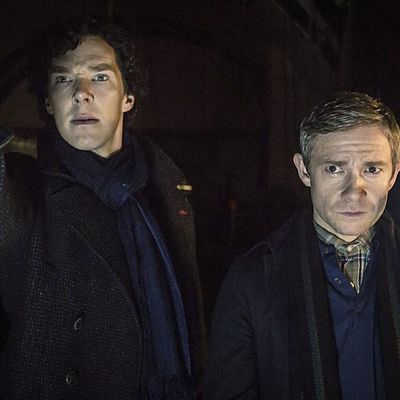
It’s been two years since we’ve had a new installment of Sherlock, so there’s something extra thrilling about seeing that long coat billow anew behind Benedict Cumberbatch. When season three premieres on PBS Sunday night at 10, Sherlock’s quips will seem quippier, his disdain for others more disdainful, and the bond between him and Watson even more powerful. Season two’s “A Scandal in Belgravia” was about sex; “The Reichenbach Fall” about glory. The third season premiere, “The Empty Hearse,” is about devotion. The people devoted to Holmes, the people to whom Holmes is devoted — and a little bit about fans who have devoted themselves to the show over the last four years.
At the end of “Reichenbach,” we viewers knew Holmes had survived his supposed suicidal jump off a building (the only way to stop his foil Moriarty’s evil schemes), but the grieving John Watson (Martin Freeman) knew no such thing. “Hearse” picks up two years later, with Watson still in a state of semi-mourning — as signified by a somewhat seedy mustache. He’s also preparing to propose to his girlfriend, Mary (Amanda Abbington, Freeman’s longtime companion), and one wonders if Watson would ever have been able to make room in his life for a significant relationship had Sherlock not been “dead.” But the great detective is alive (and the show has some fun teasing us with the hows and whys of his survival), and so the two of course must reunite — and there’s a dazzling, Marx Brothers–esque sequence in a restaurant with Sherlock trying to surprise Watson by hiding in plain sight, even though this revelation will be quite painful for Watson, who struggled with issues of guilt and grief before he met Holmes. It’s a quintessential Sherlock scene, one that uses a slapstick tone and impressive comic choreography to disguise the fact that something heavy is happening, like Moriarty’s ringtone being the Bee Gees’ “Staying Alive.” Sherlock is all about how cleverness ameliorates cruelty. Yes, I caused you tremendous and ultimately unnecessary emotional pain, but you gotta admit, I did it with style.
That’s the deal Sherlock strikes with its fans, too, and it’s a deal most of us are more than willing to make. Sherlock (and Sherlock) is that good, we do forgive his callousness, and yeah, we’ll wait for two years for his return and never let our fervor flag. In exchange, when the miracle happens and he (and the show) come back, he’s as good or maybe better than ever.
Sherlock’s two-year absence affected more than just Watson. Anderson, the Scotland Yard police officer who openly loathed Sherlock (and whom Sherlock loathed back), is now a major Sherlock conspiracy theorist, even organizing a group of fellow Holmes devotees who — before the presumed-dead detective reemerges — gather to share their occasionally crackpot ideas about how he could have faked his suicide. Given the group members’ tendency to insert romantic moments into their stories, it’s hard not to feel like this group is a stand-in for the show’s actual obsessive fans who find moments of erotic significance in seemingly innocent gestures. (Or perhaps this club is meant to represent Tumblr in toto.) It’s as if creator David Moffat is embracing and dismissing these fantasizing fans all at once — again, in keeping with Sherlock and Sherlock.
“The Empty Hearse” is funny and exciting, heavier on the action than some other installments, but it also has a lot of work to do to move through Watson forgiving his best friend for faking his death. Freeman’s performance has always been the emotional engine of the show, and in “Hearse” he’s as powerful as ever. Sherlock can be a harsh and jagged show, with its zippy score, angry characters, jumpy editing, its perfect but almost-stressful use of technology (all those texts piling up on the screen), its sense of impending doom. The moments of softness or vulnerability tend to come from Watson, and that flips a little in “The Empty Hearse.” Suddenly Sherlock is slightly vulnerable, and Watson’s the one who’s fed up. It’s not a radical change, nor is it a permanent one, but it does add a richness to the season, another layer to Watson and Sherlock’s deep relationship.
But there is one part of “The Empty Hearse” that threw me. In a moment of great distress (which I will not spoil here), Watson declares that Sherlock is the “best and wisest man” that he has ever known. Sherlock’s certainly among the most interesting people one could know, the cleverest, and maybe the smartest. But Sherlock isn’t wise. Watson is wise. Whether they realize it or not, Watson and Sherlock see themselves in each other throughout the show — what happens to one always happens to both, and Sherlock’s death was in some ways Watson’s death too. But, fortunately, now both are alive, and goddamnit, it’s great.




